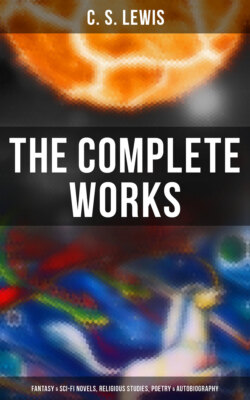Читать книгу The Complete Works: Fantasy & Sci-Fi Novels, Religious Studies, Poetry & Autobiography - C. S. Lewis - Страница 142
На сайте Литреса книга снята с продажи.
I
ОглавлениеDaylight came with no visible sunrise as Mark was climbing to the highest ground in his journey. The white road, still virgin of human traffic, showed the footprints of here and there a bird and here and there a rabbit, for the snow-shower was just then coming to its end in a flurry of larger and slower flakes. A big lorry, looking black and warm in that landscape, overtook him. The man put out his head. “Going Birmingham way, mate?” he asked.
“Roughly,” said Mark. “At least I’m going to St. Anne’s.”
“Where’s that, then?” said the driver.
“Up on the hill behind Pennington,” said Mark.
“Ah,” said the man, “I could take you to the corner. Save you a bit.”
Mark got in beside him.
It was mid-morning when the man dropped him at a corner beside a little country hotel. The snow had all lain and there was more in the sky and the day was extremely silent. Mark went into the little hotel and found a kind elderly landlady. He had a hot bath and a capital breakfast, and then went to sleep in a chair before a roaring fire. He did not wake till about four. He reckoned he was only a few miles from St. Anne’s, and decided to have tea before he set out. He had tea. At the landlady’s suggestion he had a boiled egg with his tea. Two shelves in the little sitting-room were filled with bound volumes of The Strand. In one of these he found a serial children’s story which he had begun to read as a child, but abandoned because his tenth birthday came when he was half-way through it and he was ashamed to read it after that. Now, he chased it from volume to volume till he had finished it. It was good. The grown-up stories to which, after his tenth birthday, he had turned instead of it, now seemed to him, except for Sherlock Holmes, to be rubbish. “I suppose I must get on soon,” he said to himself.
His slight reluctance to do so did not proceed from weariness—he felt, indeed, perfectly rested and better than he had felt for several weeks—but from a sort of shyness. He was going to see Jane: and Denniston: and (probably) the Dimbles as well. In fact, he was going to see Jane in what he now felt to be her proper world. But not his. For he now thought that with all his lifelong eagerness to reach an inner circle he had chosen the wrong circle. Jane was where she belonged. He was going to be admitted only out of kindness, because Jane had been fool enough to marry him. He did not resent it, but he felt shy. He saw himself as this new circle must see him—as one more little vulgarian, just like the Steeles and the Cossers, dull, inconspicuous, frightened, calculating, cold. He wondered vaguely why he was like that. How did other people—people like Denniston or Dimble—find it so easy to saunter through the world with all their muscles relaxed and a careless eye roving the horizon, bubbling over with fancy and humour, sensitive to beauty, not continually on their guard and not needing to be? What was the secret of that fine, easy laughter which he could not by any efforts imitate? Everything about them was different. They could not even fling themselves into chairs without suggesting by the very posture of their limbs a certain lordliness, a leonine indolence. There was elbow-room in their lives, as there had never been in his. They were Hearts: he was only a Spade. Still, he must be getting on. . . . Of course, Jane was a Heart. He must give her her freedom. It would be quite unjust to think that his love for her had been basely sensual. Love, Plato says, is the son of Want. Mark’s body knew better than his mind had known till recently, and even his sensual desires were the true index of something which he lacked and Jane had to give. When she had first crossed the dry and dusty world which his mind inhabited she had been like a spring shower; in opening himself to it he had not been mistaken. He had gone wrong only in assuming that marriage, by itself, gave him either power or title to appropriate that freshness. As he now saw, one might as well have thought one could buy a sunset by buying the field from which one had seen it.
He rang the bell and asked for his bill.
